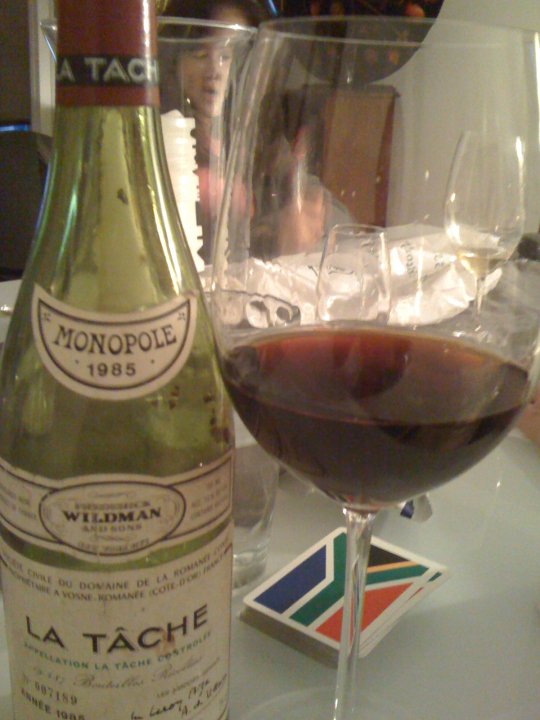I drink very well today. Only last night I drank Chateaux Ducru Beaucaillou and Angelus 1994.
But I drank better in days of yore. I was rumaging around in my attic today and I came across these:
From left to right:
Domaine Ponsot Clos De La Roche Cuvee Vieilles Vignes 1985, drank in 1993
Domaine Ramonet Montrachet 1982, drank in 1998
Chateau Petrus 1964, drank in 1997
Domaine De La Romanee Conti Romanee Conti 1985, drank in 1999
Jaboulet Hermitage La Chapelle 1978, drank in 2007
Chateau Haut Brion 1989, drank in 2000
Penfolds Grange Hermitage 1971, drank in 2003.
These are seven of the best wines I have ever drunk, seven of the top ten. The other three would be Chateau d'Yquem 1937 (drank in 1998) and 1976 (drank in 1999) and Chateau Pichon Lalande 1982 (drank in 1998).
I also came across these:
From left to right
Chateau Mouton Rothschild 1975 (a good bottle, drank in 2005)
Henri Jayer Echezeaux 1987 (drank in 1999)
Le Pin 1990 (drank in 2002)
Guigal Cote Rotie La Turque 1985 (drank in 2004)
Chateau Lafite-Rothschild 1990 (drank in 2002)
Chateau Lynch Bages 1961 (drank in 2011)
Domaine De La Romanee Conti La Tache 1982 (drank in 1995)
Chateau d'Yquem 1983 (drank in 1996)
Armand Rousseau Chambertin 1987 (drank in 2001)
Guigal Cote Rotie La Mouline 1985 (drank in 1996)
Gaja Barbaresco Sori Tilden 1990 (drank in 2002)
Chateau Latour 1990 (drank in 2002)
None of these wines I could remotely afford today.
Why have fine wine prices gone up so much (the Liv-ex index of 100 top investment grade wines has gone up about 250% in the last ten years)?
And who is to blame?
Is it:
1) Alan Greenspan, Ben Bernanke and other central bankers?
2) Governments in collusion with criminal oligarchs/white collar criminals?
3) The Chinese?
4) Robert Parker?
5) All of the above?
Well its not Robert Parker's fault even though he is occasionally irresponsible in hyping wines. There are much darker and powerful forces at play.
It is all of the rest of the above.
There are three main reasons why fine wine prices have soared, and they are hardly mutually exclusive:
1) Recklessly easy monetary policy over the last 15 or so years, led by the US Fed, masquerading behind the cloke of the so-called 'great moderation' a euphemism for a great credit boom. The other side of the coin has been multiple asset bubbles.
2) An unprecedented shift in the distribution of wealth to the (already) super-rich, some of whom are criminal oligarchs/white collar criminals who have colluded with a complicit and corrupt political class, notably in the United States but just about everywhere else too.
3) A large and permament shift in the global demand curve for fine wine as the Chinese and the rich in developing countries have caught the wine bug. This has been allied to a relatively inelastic supply response..the supply of fine wine reponds quite weakly to an increase in demand and prices.
What is the outlook for fine wine prices?
To understand the outlook one needs to examine each of these three pillars and drivers of wine prices.
The great moderation involved the aggressive use of monetary policy to encourage people to borrow whenever the economy slowed as a result of the previous debt binge. Policymakers could do this because of relentlessly decling manufactured goods prices, which guaranteed low inflation. The marginal productivity of an extra dollar of debt declined inexorably to the point where policy rates were taken down to zero or thereabouts in the 'G4' - the chronically over-indebted US, UK, eurozone and Japan.
Having splurged recklessly in the good times, come the crisis there was less scope for the G4 to support their ailing economies with fiscal policy leaving a greater burden for monetary policy. Because interest rates had already been cut as far as possible central banks entered the murky and sinister world of quantitative easing, aka money printing, dangerously blurring the distinction between monetary and ficsla policy.
When a central bank starts creating money out of thin air everybody benefits equally as depicted by Friedman's monet being dropped out of a helicopter analogy right? Wrong! Those who benefit first are those 'in the know' - the well connected, the rich and those who operate in financial markets. When the money spigots turn on these people buy 'risk assets' - equities, lower grade corporate bonds, commodities...and also other assets like art and wine.
After a few months this shows up in higher food and petrol prices and the people at the bottom of the food chain suffer, because these staples make up a much higher proportion of their outlays. Money printing is a way in which politicians and policymakers can make themselves and their wealthy sponsors richer at the expense of everyone else. When a very rich man receives a financial windfall, he is not going to buy groceries with that windfall. He is going to go out and buy a piece of art or some fine wine. And only the best will do. These days there are more billionaires being created in emerging markets than devloped markets and they have discovered fine wine.
As the G4 countries fall deeper and deper in to the abyss in 2012 and beyond their will be more money printing, and fine wine prices are likely to resume their upwards trend after the recent correction. We will get:
- More money printing
- More corruption
- More interest in fine wine in emerging markets
Eventually we will get the people's revolution. The 99 per centers on Wall Street is just the beginning.



No comments:
Post a Comment